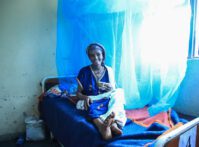-
Healthy Women, Healthy Economies: A Look at Brazil (New Report)
May 22, 2019 By Elizabeth Wang
“Globally, women face obstacles to entering, advancing in, and remaining in the workforce as a result of gender discrimination, harassment, and a lack of supportive, gender-sensitive policies.” – Healthy Women, Healthy Economies: A Look at Brazil
In Healthy Women, Healthy Economies: A Look at Brazil, Sarah B. Barnes, Project Director of the Maternal Health Initiative, and Elizabeth Wang, Maternal Health Initiative Intern, discuss the intersections of women’s health and well-being and their economic empowerment. The report also takes a look at current progress and remaining barriers to female participation in Brazil’s workforce.
Female labor force participation (FLFP) benefits not only women themselves but also their countries’ economies. Increased FLFP has been shown to improve productivity, economic diversification, and income equality both within companies and economies. Economically empowered women also exercise more agency, decision-making, and control over their time, lives, and bodies.
Healthy Women Healthy Econo… by on Scribd
Health-related issues, such as non-communicable diseases, lack of access to family planning services, and maternal health complications, greatly impede women’s ability to engage in the workforce. Many workplaces also lack gender-sensitive policies that take into account women’s specific needs, such as paid leave, flexible work schedules, and adequate reporting mechanisms for sexual harassment and violence. The report also notes that women are heavily involved in the unpaid and informal work sectors due to the burden of caregiving and other domestic responsibilities, which prevents women from becoming economically empowered.
The report highlights Healthy Women, Healthy Economies (HWHE), an initiative created by Asia-Pacific Economic Cooperation (APEC) with Merck KGaA, Darmstadt, Germany, to inform policies to support women’s economic participation. The Healthy Women, Healthy Economies Policy Toolkit compiles global good practices for governments, companies, and NGOs to include and retain women in the workforce.
The toolkit focuses on five key areas: (1) workplace health and safety, (2) health access and awareness, (3) sexual and reproductive health, (4) gender-based violence, and (5) work/life balance. The toolkit also offers recommendations on how to create supportive, productive workplaces by addressing many obstacles that prevent women from accessing paid employment opportunities and fulfilling their economic potential.
In a Q&A with Sarah Barnes, Mayra Barreto, Senior Institutional Relations Analyst at Merck Brazil, discussed the implementation of the Healthy Women, Healthy Economies Toolkit in Brazil, as well as policies and practices to protect women and mothers in the workplace. While progress has been made to support Brazilian women, the gender pay gap, a lack of childcare options, the current political climate, and other aspects still need to be addressed to help more women get into the work force, said Barreto. Barreto also discussed the success Merck Brazil has experienced internally, as a company, and externally, through outreach, education, and advocacy due to the implementation of the toolkit. With resources like this toolkit, countries and companies can adapt to women’s needs for economic empowerment to the benefit of everyone.
Read more:
Photo Credit: Shutterstock. All rights reserved.
 A Publication of the Stimson Center.
A Publication of the Stimson Center.






